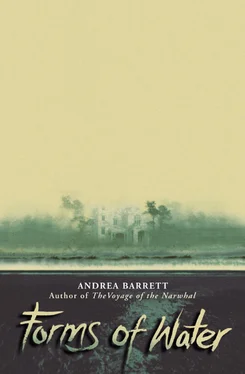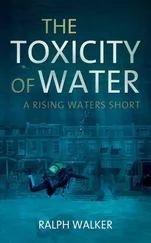“But we don’t have the maps,” Win said.
“But I remember,” Wendy said. “Sort of. Don’t you? All we have to do is head for the reservoir. We could find it on a road map, and once we were there we could figure out the rest.”
“You’re out of your mind,” Win said.
“Completely,” Lise agreed.
But Christine was smiling at her broadly. “What an intelligent young woman you are,” she said, and Wendy’s skin prickled in warning. “You’d be doing your mother a favor if you could help her out, keep your father from interfering — and you’d be helping your great-uncle, too. I need to see him very soon.”
“This is my idea,” Wendy said. “We’re not going because of you.” She turned to Delia. “Would you come with me?”
“I guess.” Delia looked at her sister nervously. “You can’t go by yourself. Maybe Roy …”
“I’ll drive,” Roy said. “If you have to go, we’ll take my car. You’ve had too much to drink.”
“If you think you’re taking off at this hour with these two girls …,” Lise said.
“You can come,” Roy said mildly. “If you want.”
“I’m not staying here alone,” Win said. He tilted his head toward Christine. “Not with her.”
“I’ll stay here,” Christine said. “Keep an eye on things.”
She smiled at Wendy again, but Wendy ignored her. This wasn’t Christine’s idea, it had nothing to do with her. They weren’t going after Grunkie just to bring him back to Christine. They were going, she thought, because their parents were children; because they were confused and lost and destructive and incapable of caring for themselves. They were so busy chasing after a past they couldn’t recover that they couldn’t see what was happening right in front of their eyes. Somewhere, she knew, her mother was sitting next to her father and pretending they were still married — wishing, dreaming. Undoing everything she’d spent four years working through. Somewhere her uncle Henry was trying to fix his life by tunneling back to the years before he’d wrecked it.
They’d always been that way — she and Win had known that for years, and now Lise and Delia knew it too. Their parents weren’t like other parents because they had no parents of their own. Sometimes, when she and Win had been living with their father, she had tried to imagine growing up without her parents, in the care of two people as old as Grunkie. Sometimes she tried to imagine the moment her mother had once described, when strangers had come for her and Henry and said, “Come with us. Your parents have been in an accident.” Then, for brief stretches, she’d been able to understand her mother’s quirks.
Their parents needed looking after, and watching over, and she and Win and Lise and Delia were going to rescue them and bring them home. This time it wouldn’t turn out the way it had when she and Win were children. They were adults now, capable and smart. They could fix whatever it was that had gone wrong, and when they were done they could put the past behind them and move on.
“Let’s go,” she said. “If we’re going. They’re hours ahead of us.” She went into the living room and grabbed her flipflops, a light jacket, and the big embroidered bag. The dolls looked forlorn, propped against the pizza boxes, and at the last minute she took them with her as well.
SOMEONE HAD WANTED THE RESTAURANT TO LOOK OLD. THE outside was clothed in the same white concrete as the sporting goods store and the discount outlet, but inside someone had paneled the walls with barn boards and installed ceiling fans and a long, scarred wooden bar with brass footrails. The tables were round and sturdy and the chairs were soft; the pink glass of the sconces cast a kind light on the middle-aged crowd. Wiloma had had two margaritas already, although she hadn’t had more than a glass of wine in years. And after the long, dark drive, and the excitement of finding the park at the reservoir’s southern tip, and then the disappointment of discovering that the Visitors’ Center was closed until ten on Sunday morning, the drinks had hit her like a hammer.
She and Waldo had arrived too late for a real dinner; their waitress, no older than Wendy, had offered them a snack menu composed almost entirely of batter-fried foods. Fried onion rings, fried zucchini, fried mushrooms and mozzarella sticks — the potato skins had seemed like the safest bet, but the orange cheese stuck to her teeth like gum and left a waxy film on her tongue. She looked across the table to Waldo and he said, “Another?” Before she could stop him, he’d ordered a new round of drinks.
He was at home here, Wiloma saw, at ease with the waitresses, familiar with the crowd and the food. She wondered if Sarah often brought him to places like this. He touched her hand lightly and said, “Those skins okay? I’m sorry we couldn’t get something more substantial.”
“They’re fine. It’s nice here.” And it was pleasant enough, especially now that the drinks had made her so relaxed. Her feet and fingers tingled. Her face felt warm. And Waldo had been kind all night, even before they’d finally found this place. At the park, when they’d driven up the narrow road and found the gates closed in front of the Visitors’ Center, with the Ronan Dam shining huge and dim in the moonlight just beyond the building, he had patted her shoulder while she wept.
The sight of the dam had broken through the discipline of her detoxification and made her remember all the Sunday mornings her father had taken her and Henry and her mother there. It had made her remember him — how he’d cried when he’d first seen her and nearly crushed her in his arms. She had been almost four when he came home from the war, and she’d never heard his voice before or seen more than a picture of him. He’d been a stranger, thin and pale and hoarse, his skin splotched and scarred. He slept beside her mother, in the warm hollow that had always been hers, and she had been moved to a cot in Henry’s room. At first he’d hardly talked at all. But slowly, as they got used to each other, he’d begun to take them on walks around the edges of the reservoir. They’d explored the peninsula that stretched around their home; he’d pointed out the roads that ended in water, the cellar holes, the crumbling stone walls. Later, after he bought a car, they’d driven to the north tip and the narrow western finger, and then finally to the base where the dam rose up. That had become the place they’d visited most often. For three years, until the accident, that had been the place where she’d begun to know the stranger who was her father.
There had been no park then, no paved lots or neat signs or picnic tables: only the one road to the dam, which was closed to the public, and a handful of trails winding through woods and weeds. The trail Wiloma’s father always took them on led to a knoll quite close to the dam. They had sat there on an old blanket and gazed at the long, low mass holding back the water.
“I watched them build that,” her father used to say. “It’s just dirt inside the facings: packed dirt. That’s all that’s holding the water in.” He’d pointed to the islands dotting the water and said, “Mt. Washburn. Mt. Doubleday. Those used to be hills — we used to climb them.” Then he’d launched into stories about the drowned towns. Winsor, Stillwater, Pomeroy, Nipmuck; where he used to live. The tiny branch of the railroad that had run north and south through the valley, following the Paradise River and stopping every few miles. On and on he’d gone, using words she couldn’t understand, describing sights she couldn’t imagine — she’d been five, and then six and then seven, and it was all she could do to get used to his presence.
Читать дальше












